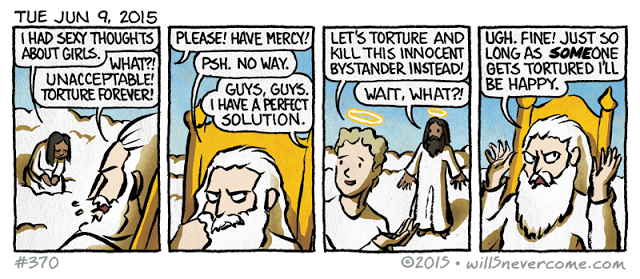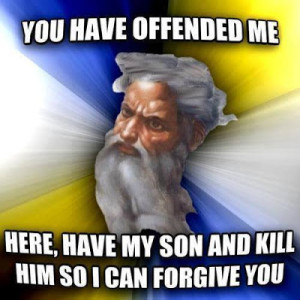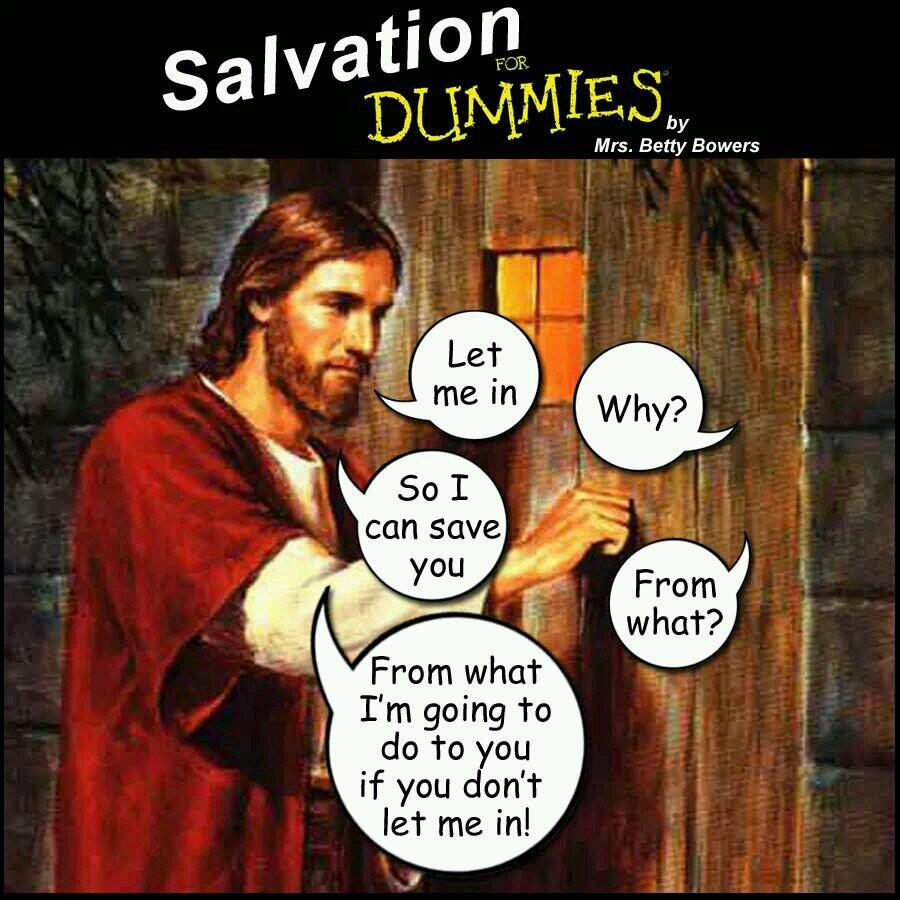“Behold, I Am Jesus Christ, the Savior of the World”
Reading assignment
Study the scripture passages listed in the following questions and in the scripture chain for this lesson.
D&C 19:16–19
D&C 88:14–18; 93:33
D&C 18:11–12; 19:16–17, 20; 58:42; 76:62–70
D&C 6:20–21
D&C 6:32–37
D&C 19:1–3
D&C 29:1–2
D&C 38:1–3
D&C 45:3–5
D&C 50:44
D&C 93:5–19
D&C 133:42–52
Links: Teacher’s manual | Student manual
It’s a busy year for Your Humble Godless Doctrine teacher. So I’m posting this lesson as kind of a rough outline, with the intention of filling in the details later. Think of this as the notes that a Gospel Doctrine teacher would walk into class with.
Overview
This lesson is about Jesus, whose job was to fill in for the inadequacies that God built into his system. God created a system where he decided that there were some actions that he didn’t like, and if anyone did those things, they’d have to be punished forever. (This probably involves eternal isolation from loved ones.)
Even so, he insists that people are his thing.
D&C 18:10 Remember the worth of souls is great in the sight of God;
11 For, behold, the Lord your Redeemer suffered death in the flesh; wherefore he suffered the pain of all men, that all men might repent and come unto him.
This scripture says that “the worth of souls is great”, and yet God decided to create an awful lot of people who he knew in advance would not accept the gospel, and who would therefore be stuck in a lower kingdom or in outer darkness for eternity.
Punishing people for eternity is a bit harsh, so God made a loophole (for a rule that he created): an innocent person could be tortured and killed instead.

This means that, instead of simply forgiving everyone, God decided to kill his son Jesus, and then forgive people.

However, he will only forgive those few people who decided (on the basis of no evidence) to believe that such a nonsensical mechanism was a good idea.
He will then force everyone else to suffer torment like Jesus did.
D&C 19:16 For behold, I, God, have suffered these things for all, that they might not suffer if they would repent;
17 But if they would not repent they must suffer even as I;
Translation: “I will torture my son, so that I don’t have to torture you. Then I will torture you.”
Why would a God demand suffering from his creations? This is unnecessarily sadistic.
Sacrifice
From the manual:
Read D&C 122:8 with class members.
D&C 122:8 The Son of Man hath descended below them all. Art thou greater than he?
Actually, yes — all of us are greater than Jesus, if we don’t teach that hell is real, and we don’t intend to kill billions of people at our return.
Remember also how, in the Book of Mormon, Jesus levelled entire cities full of people, and then bragged about it from the sky.
In what way has the Savior “descended below” all things?
Not in any meaningful way. He had a bad weekend, knowing in advance that he would be promoted to Godhood. That’s not a sacrifice; that’s a career move. Anyone who has suffered from a lengthy terminal illness has suffered more than Jesus.

Resurrection
The manual says:
Through the Atonement, we will all be resurrected
• Read the following passages with class members: D&C 88:14–18; 93:33; Alma 11:42–44. What can we learn about the Resurrection from these passages? (Answers could include those listed below.)a. Resurrection is the redemption of the soul. The spirit and the body are reunited, inseparably connected in a perfect form (D&C 88:14–16; 93:33; Alma 11:42–43).
b. Resurrection prepares us for the celestial glory (D&C 88:18).
c. Resurrection is necessary for us to receive a fulness of joy (D&C 93:33).
d. All people will be resurrected (Alma 11:44).
Resurrection seems to be a pretty important principle to Mormons. “Getting a body” is thought to be an absolute must. But this is weird for a couple of reasons.
1. Bodies are meatbags. They are fiddly and susceptible to poor reasoning when they get tired or hungry. If you already have a spirit that can reason, think, perceive, and so on, then why do you need a body?
A common explanation would be something like “To be like God, who also has a physical body.” So God is a meatbag. That explains why he was acting so crazily in the scriptures.

But wait — he’s not a meatbag like us. He’s a perfected meatbag.
None of this makes any sense.
2. God created a system where we get bodies. But he also created death, in which we lose our bodies. He then needed Jesus to do his thing, so that we can all get bodies again. Why go through the back-and-forth rigamarole? Why not just let everyone keep their bodies?
Throughout this process, God is putting everyone through a lot of silly things that didn’t need to happen in this way. He creates sin, which we can’t avoid committing. He creates death, which we can’t avoid undergoing. Then, to undo the problems that he himself created (and blames us for), he tortures and kills his son, so that he can stand to have a relationship with us again.

Advocacy
The manual again:
2. Our “advocate with the Father” (D&C 45:3)
Write Advocate on the chalkboard. Explain that several times in the Doctrine and Covenants, the Lord says that He is our Advocate (D&C 29:5; 45:3; 62:1; 110:4).
• What is an advocate? (Someone who pleads the cause of another.)
• Read D&C 45:3–5 with class members. Why do we need an “advocate with the Father”? In verses 4 and 5, what evidence does the Savior present to the Father to show that we should receive everlasting life? (First He speaks of His Atonement—His sufferings, death, and blood. Then He refers to our belief in Him.)
Apparently, there’s going to be a scene where God is about to cast us into the abyss, and then Jesus-as-lawyer pops up and convinces him not to.
D&C 45:3 Listen to him who is the advocate with the Father, who is pleading your cause before him
4 Saying: Father, behold the sufferings and death of him who did no sin, in whom thou wast well pleased; behold the blood of thy Son which was shed, the blood of him whom thou gavest that thyself might be glorified;
5 Wherefore, Father, spare these my brethren that believe on my name, that they may come unto me and have everlasting life.
Summary: God has created a flawed system in which humans will inevitably suffer. He then offered Jesus as a workaround for the flaws in his system.
Recent Comments